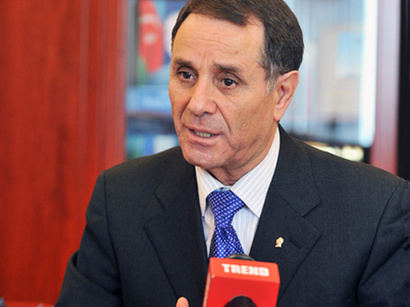Azerbaijani top official: Course of discussions on Nagorno-Karabakh conflict settlement a concern

By Aynur Jafarova
The continuation of ongoing processes dashes hopes for a peaceful solution of the Armenia-Azerbaijan Nagorno-Karabakh conflict, says deputy head of the Azerbaijani Presidential Administration, head of the foreign relations department Novruz Mammadov.
Mammadov was addressing a conference, "Shaping the Policy Agenda: British-Azerbaijani relations in the context of Europe" of the Center for Strategic Studies (CSS) under the President of Azerbaijan, in London on July 4, the Center said.
According to Mammadov, since the OSCE Minsk Group co-chairing countries and their representatives directly deal with the conflict resolution, the discussion of this issue in other frameworks is impossible.
"Unfortunately, representatives of the co-chairing countries dealing with the conflict settlement have not achieved any progress so far," Mammadov said. "Additionally, the co-chairs' statements do not refer to international law and the four UN Security Council resolutions on the conflict. This raises concern with the course of discussions."
He went on to say that twenty percent of Azerbaijani territory has been under Armenian occupation for more than 20 years.
"Ethnic cleansing policy was carried out in the territories of Azerbaijan occupied by Armenia. Over one million people became refugees and IDPs," Mammadov said, adding that the steps taken to resolve the conflict in over 20 years are fruitless.
He also said that despite the four resolutions of the UN Security Council on the conflict settlement and the fair position taken by other international organizations, the situation has not changed while there is still a threat of war.
Armenia occupied over 20 percent of Azerbaijan's internationally recognized territory, including Nagorno-Karabakh and seven adjacent regions, after laying territorial claims against its South Caucasus neighbor that had caused a lengthy war in the early 1990s. The UN Security Council has adopted four resolutions on Armenian withdrawal, but they have not been enforced to this day.
Mammadov also said that Azerbaijan has implemented many reforms and is committed to democratic principles.
"Azerbaijan is working on building civil society and ensuring democratic development," he said.
"More than 50 political parties have the opportunity to participate in the political life of the country through representation in the legislative and local municipal bodies," Mammadov said. "Azerbaijan has managed to build an ideal and tolerant society which can be exemplary for all world countries, even for Europe."
According to Mammadov, reports of some organizations and governmental institutions allege the violation of democracy and human rights in Azerbaijan. However, nothing is said about the violation of the rights of the refugees and IDPs, he said.
"We take being criticized as normal. Only fair criticism can serve the co-operation and allow overcoming various threats and challenges. Nevertheless, we think that the criticism should not be biased and unfair," he said.
"Human rights and democracy are kept simply in the context of authorities and opposition. However, what about the rights of refugees and IDPs or do they not deserve the protection?"
A document that was supported by 15-20 out of the 754 members of the European Parliament is presented as a resolution of this organization, and as a result, the European Parliament is abusing the right of the overwhelming majority of its members, Mammadov said.
"This contradicts the principles of democracy. The statistics show that the number of critical reports about Azerbaijan, which appeared in the British press within three months in relation to the criminal acts of two young Azerbaijanis that present themselves as bloggers, is more than the total number of articles written about the Karabakh problem in the last 20 years," Mammadov said.Mammadov went on to say that choosing the path of close cooperation and integration with Europe since the initial years of independence, Azerbaijan has managed to implement large projects of strategic importance and become the political, economic, cultural, energy and transportation bridge between the East and West despite strong pressure the country was facing.
"Taking this into account, it is hard to deem the attitude of the West toward Azerbaijan as a fair, well thought-out and substantiated position from political, economic, cultural, religious, geopolitical and other points of view," he said.
The cooperation of Azerbaijan with the European Union and NATO should be noted in particular, Mammadov said.
According to him, it has contributed to peacekeeping operations in Kosovo and Iraq within the international coalition.
Azerbaijan contributes to the processes in Afghanistan both by its military contingent and other means through providing training and assistance in various projects, he said.
"Today, more than one third of goods delivered to Afghanistan pass through Azerbaijan," Mammadov said.
"The ongoing global processes already demonstrate that Azerbaijan as a country will further increase its importance in the decades to come," Mammadov said.
Azerbaijan joined the event organized by the CSS jointly with the Royal United Services Institute for Defense and Security Studies with a delegation which included head of the Presidential Administration's Political Analysis and Information Provision Department Elnur Aslanov, CSS Director Farhad Mammadov, Deputy Director of the CSS Gulshan Pashayeva and leading researcher of Foreign Policy Analysis Department Zaur Shiriyev.
Here we are to serve you with news right now. It does not cost much, but worth your attention.
Choose to support open, independent, quality journalism and subscribe on a monthly basis.
By subscribing to our online newspaper, you can have full digital access to all news, analysis, and much more.
You can also follow AzerNEWS on Twitter @AzerNewsAz or Facebook @AzerNewsNewspaper
Thank you!
